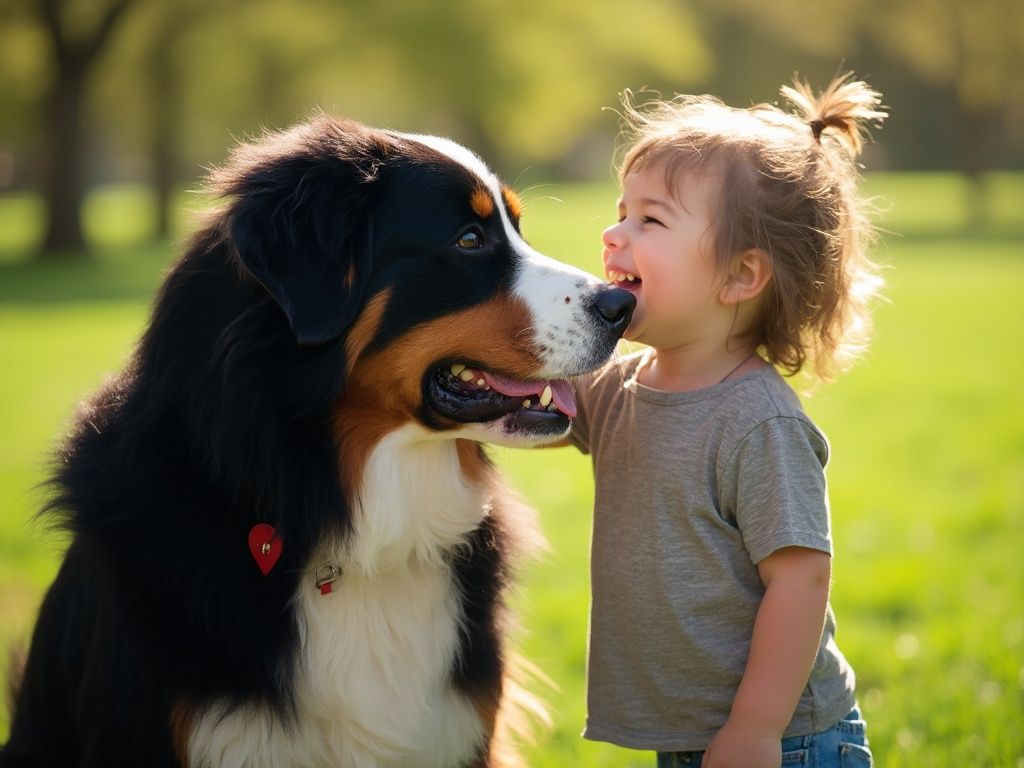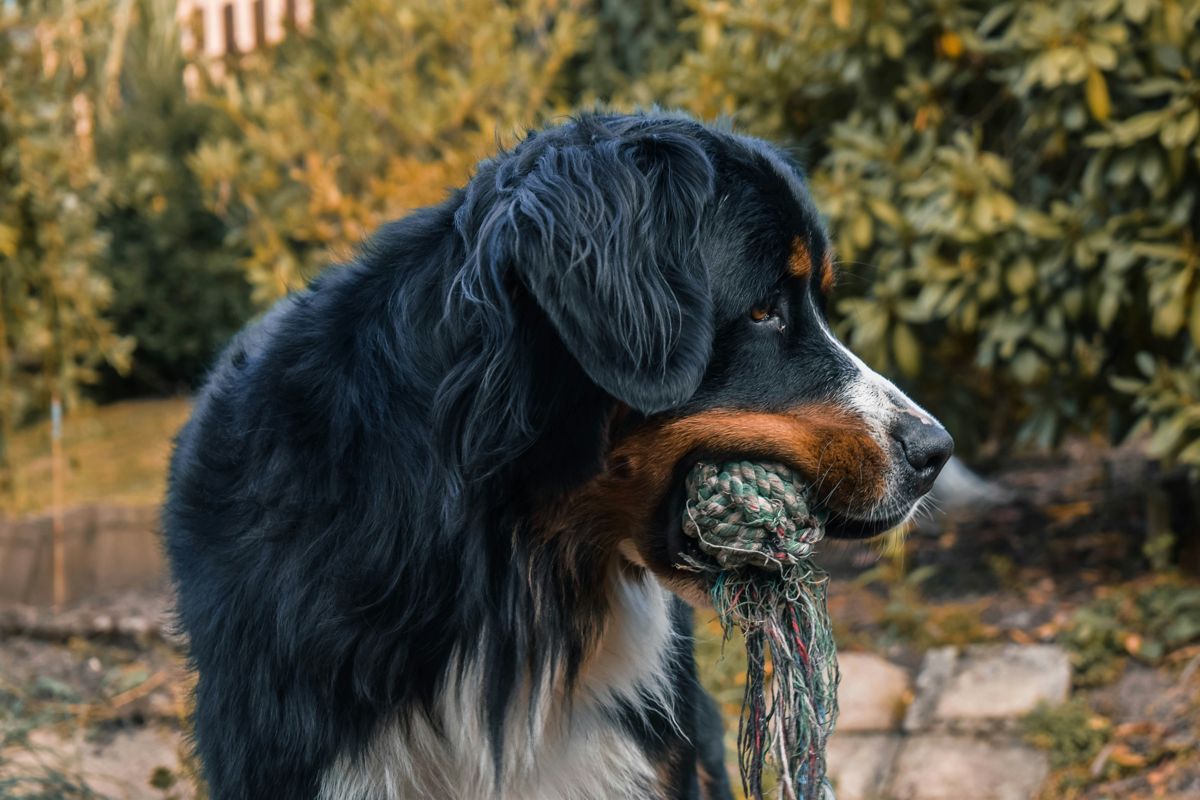Majestic, affectionate, and incredibly loyal, the Bernese Mountain Dog is both an imposing and gentle companion. Originating from Switzerland, it captivates with its beauty and balanced temperament. Whether you’re looking for a family dog or an active life companion, this giant with a big heart has everything to please.
The Origins of the Bernese Mountain Dog #
The Bernese Mountain Dog is a breed originating from the Bern region in Switzerland. Historically used as a working dog to herd cattle, pull carts, and protect farms, it is now mainly appreciated as a pet for its calm and affectionate temperament. Its history dates back several centuries, and its role in agricultural operations has helped shape its loyal and protective character.
Physical Characteristics of the Bernese Mountain Dog #
The physical characteristics of the Bernese Mountain Dog make it an imposing and majestic dog. Here are the main aspects to know.
Size and Weight #
The Bernese Mountain Dog is an imposing and well-proportioned dog.
| Gender | Height | Weight (lbs) |
|---|---|---|
| Male | 25 to 28 in | 84 to 110 lbs |
| Female | 23 to 26 in | 79 to 106 lbs |
This robust stature makes it suitable for physical work and outdoor activities.
Coat Color #
The coat of the Bernese Mountain Dog is one of its most distinctive features. It sports a tricolor coat consisting of black, white, and rust. Black dominates most of the body, while white patches are often visible on the chest, legs, and tail tip. Rust touches usually appear above the eyes and on the cheeks.
Specificities #
The dense double-layered coat of the Bernese Mountain Dog is designed to protect it from harsh weather conditions. However, it requires:
- Regular grooming to prevent tangles.
- Occasional baths after outdoor outings.
- Careful dietary monitoring to prevent stomach torsion.
How Does the Bernese Mountain Dog Behave? #
The Bernese Mountain Dog is appreciated for its calm, patient, and protective temperament.
Behavior with Children #
The Bernese Mountain Dog is known for its gentle and patient temperament with children. It is often described as an ideal family dog because it is protective without being aggressive. Its affectionate nature makes it a reliable companion for young children.

Behavior with Other Animals #
This breed is generally sociable with other animals, including dogs and cats. Early socialization is recommended to encourage positive interactions and avoid reserved or fearful behaviors.
Health of the Bernese Mountain Dog #
The health of the Bernese Mountain Dog is an important aspect to consider, as it is prone to certain genetic diseases.
Life Expectancy #
The Bernese Mountain Dog has a relatively short life expectancy compared to other breeds, generally ranging between 7 and 10 years. This lifespan is partly due to its predisposition to certain genetic diseases.
Common Diseases #
| Disease | Description | Frequency |
|---|---|---|
| Hip Dysplasia | Joint malformation that can cause arthritis | High |
| Cancer | Various types, including histiocytic sarcomas | High |
| Stomach Torsion | Medical emergency related to stomach bloating | Medium |
| Heart Problems | Including cardiomyopathies | Medium |
| Arthritis | Joint problem due to age or genetics | Medium |
Training the Bernese Mountain Dog #
Training is essential to channel the energy and intelligence of the Bernese Mountain Dog.
✔️ Positive Training Methods #
The Bernese Mountain Dog is an intelligent and eager-to-please dog, making it particularly receptive to positive training methods. These techniques involve rewarding good behaviors rather than punishing mistakes:
- Use treats, verbal praise, and toys as rewards.
- Training sessions should be short, fun, and repeated regularly to reinforce learning.
- It is important to remain patient and consistent to maintain motivation.
✔️ Importance of Early Socialization #
Early socialization is crucial to ensure your Bernese Mountain Dog becomes a balanced and sociable dog. Expose it from a young age to different people, animals, environments, and noises to reduce the risk of fearful or aggressive behaviors.
Walks in busy places, meetings with other dogs, and dog training classes can help it adapt quickly and boost its confidence.
✔️ House Training #
House training is an important step in raising a Bernese Mountain Dog puppy. Thanks to its intelligent nature, it can learn quickly, especially if you adopt a strict routine.
- Take it out after each meal, nap, and play session.
- Praise it immediately after it relieves itself in the right place.
- Quickly clean up accidents to prevent it from associating that area with a clean spot, but avoid doing it in front of it so it doesn’t take the situation as a game.
✔️ Teaching Basic Commands #
Teaching basic commands helps establish clear rules and strengthen the owner-dog relationship. Here are the essential first commands to teach:
- Sit: Ideal for capturing its attention. Start as early as 8 weeks.
- Down: Useful for calming an excited dog. From 10 weeks.
- Recall: Teach it to come back to you from 3 months to enhance safety.
- Stay: From 4 months to reinforce obedience.
- Leash Walking: Gradually introduce this exercise to prevent pulling.
❌ Undesirable Behaviors of the Bernese Mountain Dog and How to Manage Them #
Like any dog, the Bernese Mountain Dog can sometimes adopt undesirable behaviors. Here are some examples and solutions:
- Separation Anxiety: This family-attached dog may struggle with absences. Introduce gradual departures and leave it with occupation toys to reduce stress.
- Excessive Barking: Determine the cause (boredom, alert) and redirect its attention with exercises or toys. Devices like the Minitailz by Invoxia can help you know if your dog barks in your absence, allowing you to track improvements.
- Destructive Chewing: Provide it with sturdy toys and vary textures to channel this behavior.
- Leash Pulling: Use an anti-pull harness and regularly practice heel walking. Note that the harness should only be used for walks and removed upon return!

Training Exercise Examples #
The Bernese Mountain Dog needs physical and mental exercises to stay balanced and happy. Here are some suitable activity ideas:
- Search Games: Hide treats or toys and encourage it to find them.
- Long Walks: Perfect for expending energy and strengthening your bond.
- Light Agility: Opt for obstacle courses adapted to its size to stimulate agility.
- Obedience Games: Repeat commands like “sit” and “down” to reinforce basics.
With appropriate training and positive methods, the Bernese Mountain Dog will become a balanced and obedient companion, ready to follow you on all your adventures!
Character and Lifestyle of the Bernese Mountain Dog #
The Bernese Mountain Dog is known for its affectionate, calm, and protective temperament. It is a dog that loves company and thrives when surrounded by its family. Let’s discover the key aspects of its character and lifestyle.
Physical Activity and Exercise #
Although naturally peaceful, the Bernese Mountain Dog needs regular exercise to stay healthy and avoid weight gain. A daily walk of at least one hour is recommended, along with outdoor games to stimulate its energy and intelligence.
It particularly enjoys moderate activities like hiking and search games. However, due to its large size, it is preferable to avoid overly intense exercises to preserve its joints.
Indoor Character #
The Bernese Mountain Dog is a calm and composed dog indoors. It likes to rest near its owners and follow their movements around the house. Its gentle nature makes it ideal for families with children, but it can also be reserved with strangers, while rarely being aggressive.
However, it does not tolerate prolonged solitude well. This constant need for companionship means it is better suited for homes where it won’t be left alone for long periods.
Character with Family and Other Animals #
This dog is very attached to its family and is particularly protective of its loved ones. It is known for being gentle and tolerant with children, making it an excellent family dog.
With other animals, the Bernese Mountain Dog is generally sociable, especially if well-socialized from a young age. It can harmoniously coexist with other dogs or cats, although a gradual introduction is recommended to ensure good relations.
Living Environment #
The Bernese Mountain Dog adapts better to homes with gardens where it can exercise freely. It is not recommended for apartment living unless its exercise needs are rigorously met.
It appreciates open spaces and cool climates, as its dense fur protects it well against the cold. However, it can suffer from heat, so it’s essential to provide it with a shaded and cool spot during summer!
Grooming and Hygiene of the Bernese Mountain Dog #
The Bernese Mountain Dog, with its beautiful long and dense coat, requires regular grooming to stay healthy and maintain a neat appearance.
Grooming and Coat Care #
The thick and slightly wavy coat of the Bernese Mountain Dog requires special care to prevent tangles and dirt buildup.
- Brushing: It is recommended to brush its coat 2 to 3 times a week to remove dead hair and prevent tangles. During shedding periods, in spring and fall, daily brushing may be necessary.
- Bathing: A bath every 2 to 3 months is generally sufficient, unless there is significant dirt. Use a gentle shampoo suitable for dogs to preserve the quality of its coat.
- Drying: After bathing, ensure its coat is well-dried, especially if thick, to prevent skin irritations and unpleasant odors.
Ear Care #
Due to its drooping ears, the Bernese Mountain Dog can be prone to ear infections. It’s important to inspect and clean its ears once a week with a suitable solution.
Dental Hygiene #
The Bernese Mountain Dog can be prone to dental problems if it doesn’t have good oral hygiene. Here are some recommendations:
- Brush its teeth 2 to 3 times a week using a brush and toothpaste specially designed for dogs.
- Offer it chew toys or dental treats to help reduce tartar buildup.
Nail Trimming #
Its nails should be trimmed every 4 to 6 weeks, especially if not naturally worn down during walks. Regular trimming prevents them from becoming too long and causing discomfort or injuries.
Diet #
A balanced diet is essential to maintain its health and shiny coat. Opt for food rich in proteins and essential fatty acids.
- Quantity: Adjust portions to its age, weight, and activity level.
- Hydration: Ensure it always has fresh and clean water available.
- Supplements: You can add dietary supplements like fish oils to improve skin and coat health.

Parasite Prevention #
Protect your Bernese Mountain Dog against fleas, ticks, and worms using suitable antiparasitic treatments. If you often walk in the woods, these products will be indispensable! Consult your veterinarian to choose the best-suited products.
With regular grooming and appropriate care, the Bernese Mountain Dog will maintain its natural beauty and stay in great shape to share long moments of happiness with you!
Adoption and Cost #
Adopting a Bernese Mountain Dog represents an emotional and financial investment, so it should not be taken lightly.
Adoption Price #
The adoption price of a Bernese Mountain Dog generally varies between €1,200 and €2,500, depending on the lineage and breeder.
Cost #
-
Food: Approximately €60 to €100 per month for high-quality food suitable for its size.
- Hygiene and grooming products: €30 to €50 per month for shampoos, brushes, dental care, and other maintenance products.
- Veterinarian: Plan for €200 to €400 per year for check-ups, vaccines, and antiparasitic treatments.
-
Dog insurance: Opting for dog insurance can also be a good investment given its predispositions to certain diseases. Expect to pay between €20 and €50 per month depending on the insurance and coverage.
The Bernese Mountain Dog is an ideal companion for those seeking an affectionate and loyal dog. With its gentle and protective temperament, it integrates perfectly into families!
Whether you live in the countryside or in suburban areas with enough space, this dog will fill you with joy and love. If you’re ready to devote time and attention to it, the Bernese Mountain Dog will faithfully accompany you for many years.

